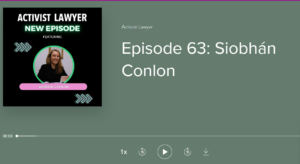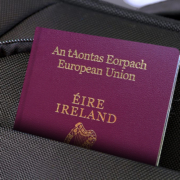We are regularly contacted by non-national clients seeking advice and assistance in respect of their immigration status in the circumstances where they have either separated or divorced from their EU citizen spouse. While the technical differences between an informal separation on the one hand, and a full and final divorce on the other, can seem irrelevant in the personal lives of those involved, the immigration ramifications of each are very different.
This blog post will give an overview of the law on EU Treaty Rights and how a separation and divorce impacts rights of residence, and what options may be open to persons in those situations. While the focus is on spouses, we also outline what happens when ‘de facto partners’ separate. While the 2004 Directive applies to EU family members, we are concerned here only with non-EU family members. This blog will give readers a simple and quick guide to their immigration issues, and how we may best assist them in regularising their status.
Rights of Residence – Directive 2004/38/EC
EU Treaty Rights refers to the rights of residence of family members (irrespective of nationality) of EU citizens exercising their EU free movement rights in a host country. Residence rights within the European Union for Union citizens stem from various provisions of EU law relating to their ‘Citizenship of the Union’, and the free movement of workers, particularly Articles 20, 21, and 45 of the Treating on the Function of the European Union (the ‘TFEU’).
Those Treaty provisions are then detailed in more specific legislation, specifically Directive 2004/38/EC (the ‘2004 Directive’). Article 3(1) of the 2004 Directive provides that it “shall apply to all Union citizens who move to or reside in a Member state other than that of which they are a national, and to their family members as defined [in Article 2(2)] who accompany or join them”.
Article 2(2) defines “family member” to include spouses and registered partners, parents and grandparent, children and grandchildren. However, there are other categories of persons – such as cousins, aunts and uncles – who may avail of EU Treaty Rights under Article 3(2)(a). Persons in relationships, although not married or registered, may seek residence as being in a “durable relationship, duly attested”, commonly known as ‘de facto partners’.
The residence rights of EU citizens and their family members contained within the 2004 Directive are implemented into Irish law by the European Communities (Free Movement of Persons) Regulations 2015 (the ‘2015 Regulations’), as amended. Once applications for residence under the 2004 Directive and 2015 Regulations are made and approved, the family member concerned will be given a Stamp 4 EU FAM permission by the EU Treaty Rights Unit of the Immigration Service Delivery. This permission is typical for 5 years, after which, they may apply for Permanent Residence.
However, what happens if, for example, you are the non-national spouse of an EU citizen and you separate or divorce within the period of your 5-year permission?
Separation, Divorce, and ‘Retained’ Rights of Residence.
Separation
The 2004 Directive is silent as to what happens to the residence rights of a non-national spouse who separates from the EU spouse, but nonetheless remains legally married to them. However, it is the Directive’s silence that the Irish and EU Courts have considered in concluding that simple separation does not result in a loss of residence rights. Separation also generally results in residing in separate addresses, and there is no requirement in the 2004 Directive for spouses to reside together.
In Case C-244/13 Ogieriakhi v The Minister for Justice and Equality, the Court of Justice of the European Union (‘CJEU’) considered the issue of separate addresses following separation, confirming that there is no requirement to reside together. To hold otherwise – in the opinion of the CJEU in the context of permanent residence under Article 16 – would:
“ deprive [the 2004 Directive] provisions of their effectiveness…if Article 16(2) of the 2004 Directive were to be interpreted literally, a third-country national could be made vulnerable because of unilateral measures taken by his spouse, and that would be contrary to the spirit of that 2004 Directive, of which one of the objectives is precisely — according to recital 15 thereto — to offer legal protection to family members of citizens of the Union who reside in the host Member State, in order to enable them, in certain cases and subject to certain conditions, to retain their right of residence exclusively on a personal basis”
Even where there is a formal separation agreement just short of divorce, a person’s residence rights are not negatively impacted or otherwise invalidated. The CJEU in Case C-287/83 Diatta stated, in the context of pre-2004 Directive free movement legislation, that “… the marital relationship cannot be regarded as dissolved so long as it has not been terminated by the competent authority. It is not dissolved merely because the spouses live separately, even where they intend to divorce at a later date”. This rationale was applied to the provisions of the 2004 Directive by the CJEU in Case C-40/11 Iida wherein the Court held that:
“…the marital relationship cannot be regarded as dissolved as long as it has not been terminated by the competent authority, and that is not the case where the spouses merely live separately, even if they intend to divorce at a later date. … In the present case, the marriage of Mr and Mrs Iida has not been dissolved by the competent authority, so that Mr Iida may be regarded as a family member of his spouse within the meaning of that provision of Directive 2004/38”
The caselaw of the CJEU is clear that informal separation – even if there is a formal separation agreement and separate addresses – does not invalidate a person’s rights of residence so long as the EU citizens remains in the State in exercise of their EU rights. Divorce, on the other hand, does have significant ramifications.
Divorce
A family member who divorces their EU citizen spouse may face having their right of residence in Ireland revoked unless the criteria for ‘retention’ of residence under the 2004 Directive are satisfied. While the 2004 Directive is silent on issues of simple separation, it does expressly provide for the situation of divorce and how a family member may remain in the host State independently following a divorce.
Firstly, the risk of revocation is simply due to the ‘derivative’ nature of residence rights. A non-national spouse gets a right of residence by virtue of being the spouse of an EU national. If they are no longer a spouse, then they no longer have a right of residence. Article 13 of the 2004 Directive, however, provides for an independent right of residence following divorce if the criteria are met. If the criteria are not met, the right of residence is revoked and the person liable to removal.
Article 13(2)(a) of the 2004 Directive provides that a divorce “shall not entail the loss of a right of residence of a Union citizen’s family members who are not national s of a Member State where:
“prior to initiation of the divorce or annulment proceedings or termination of the registered partnership referred to in point 2(b) of Article 2, the marriage or registered partnership has lasted at least three years, including one year in the host Member State”.
This means that so long as the marriage lasted at least three years, with one of those years spent in the host State, then an independent right of residence may be obtained. There are other circumstances in which a right of residence may be obtained, such as Article 13(2)(c), which states that a right of residence will not be lost in case of divorce if the divorce was “warranted by particularly difficult circumstances, such as having been the victim of domestic violence while the marriage or registered partnership was subsisting”.
It is important to note that the three-year requirement does not apply to cases where the divorce was due to “particularly difficult circumstances”. The three-year requirement also does not apply in cases where the is an agreement between former spouses for the custody of children (Article 13(2)(b) or rights of access to a child (Article 13(2)(d).
Importantly, however, is timing. The divorce must have been initiated either when the EU citizen was still in the State, or within a ‘reasonable period’ after the spouse has left the State (as per CJEU decision in X v Belgium Case C-930/19). The CJEU has not given guidance on what amounts to a ‘reasonable period’, but our observation on this case is ‘reasonable period’ may be 6 – 12 months post-departure, but this could be longer depending on the circumstances.
The default position is therefore that, if you have divorced your spouse and were married for three years with one year spent in the State, you may retain your residence independently so long as the divorce was initiated when the EU spouse was in the State, or within a reasonable period following their departure from the State. If you divorced and were not married for three years, but it was done on grounds of domestic violence (or there is custody/access arrangements), you may still retain your residence independently.
If none of these criteria are met and you divorced (say after two years marriage, no children etc.), your right of residence may be lost and you will be subject to removal (a separate process which will consider your personal circumstances in deciding to either issue a removal order, or grant a discretionary permission to remain on an independent basis).
Relationship breakdown and De Facto Partners
The 2004 Directive does not provide for any retention rights for persons who were the ‘de facto partner’ of a Union citizen. If the relationship ceases, so too does the right of residence without any express provisions in the 2004 Directive or the 2015 Regulations for a ‘retained’ right of residence. In such a case, the person concerned must notify the Immigration Service and they will have their residence card revoked and their circumstances assessed by the Immigration Service in deciding whether to issue a removal order or be issued with a discretionary permission to remain.
The above is not a substitute of legal advice in respect of your personal circumstances, and rights of residence under EU law are vast and complex. Always seek independent expert legal advice, and we are here to provide it. We have assisted dozens of people in regularising their status following familial break-down, even in some of the most complex of EU Treaty Rights cases. Get in contact to arrange a consultation and we shall provide you with the right advice for your circumstances.











